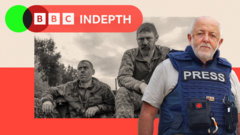In the three years since the onset of the war, Kyiv has notably changed. Once a city marked by the sights and sounds of conflict, it now displays an everyday bustle, with shops open and traffic congestions resembling ordinary city life. Yet, the collective anxiety about national preservation haunts the citizens once more, ignited by Donald Trump’s recent controversial dealings with Russia.
Since the February 12 phone call from Trump to Putin, filled with half-truths and disparaging remarks about Ukraine’s President Zelensky, the narrative surrounding the conflict has swiftly shifted. Ukrainians, who once felt a tinge of frustration over the restrained military support from President Biden, now grapple with Trump’s dismissive stance that undermines their sovereignty.
Trump's words echo Putin’s narrative, asserting that Ukraine instigated the war and suggesting that Russia is justified in keeping seized territories. This alarming shift in diplomatic tone has replaced any remnants of pressure on Russia for their aggressions, with Trump quickly offering concessions even before negotiations have commenced. His inclination to placate Putin signals a disturbing trend that embodies a risk to the independence of Ukraine.
In Kyiv, senior adviser Ihor Brusylo reflects the growing pressures felt from Trump’s comments, stating, “It’s very tough. These are hard times.” Yet, he confirms that the resolve to defend their sovereignty remains as strong as ever.
While the visible brunt of war may seem diminished in Kyiv, threats from missile strikes and drones remind the country of the relentless danger lurking at the borders. The front line sprawls over 1,000 kilometers, with towns devastated and lives irrevocably altered.
Ukrainian forces, while skilled and adaptable, express somber realities about the war's toll on both the combatants and their families. Soldiers share their experiences of facing North Korean troops aiding Russia, underscoring the multifaceted nature of this conflict.
As tensions mount, a growing division emerges within the Ukrainian populace between those actively defending their homeland and those who seek financial means to avoid military service. Yet, many combat veterans reflect a sense of pride and determination to continue the fight, illustrating a nation that recognizes its sacrifices and stands united against oppression.
Amidst this chaotic landscape, young volunteers like Maxsym Lutsyk and Dmytro Kisilenko share their experiences of growth shaped by war, expressing concern over global complacency towards aggression, drawing parallels to historical examples of appeasement that ultimately have dire consequences.
Ultimately, Ukraine’s leaders face a pivotal challenge: preserving their national identity while navigating the unpredictability of global diplomacy. The spirit of resilience pervades as Ukrainians rally to defend their country against threats both from within and outside, steadfast in their quest for self-determination.




















